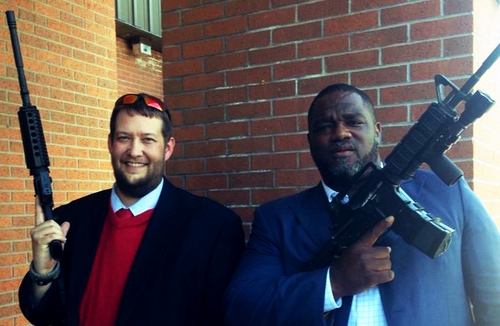I named my daughter Piper, after John Piper. I regretted that terribly the moment John Piper invited Rick Warren to speak at the 2011 Desiring God conference, lending him his credibility and, I believe, metaphorically kissing his ring. That was too much for me. Since then, Piper has repeatedly partnered with the Mystichicks, Ann Voskamp, Beth Moore, Christine Caine, and others. With Piper, enough has to be enough. Perhaps it’s the “charismatic” in him, but for all his commendably deep theology, Piper seems to lack virtually any and all discernment.
It seems that the growingly obvious lack of discernment in Piper’s life and ministry is evident in his latest article at Desiring God, Should Christians Be Encourged to Arm Themselves. With that title, you can bet that there would be plenty of Evangelical Intelligentsia nuance within the article. Pulpit & Pen will cut through that for you.
Piper begins his article, Should Christians Be Encouraged to Arm Themselves, by providing a stark contrast to Liberty University’s Jerry Falwell, Jr, who recently encouraged his students to carry a weapon in case any terrorists came there.
My main concern in the [Liberty University] article is which appeal to students that stirs them up to have a mindset to “Let’s all get guns and teach them a lesson of they come here. The concern is the forging of the disposition in Christians to use lethal force, no as policemen or soldiers, but as ordinary Christians in relation to harmful adversaries.
Piper’s concern is the disposition that ordinary Christian citizens use lethal force against harmful adversaries and not just as policemen or soldiers. This is an odd argument for Piper to make. First, he seems too reluctant to acknowledge himself a pacifist, per se, appealing to civil authority to use necessary force. Certainly, Piper would affirm Romans 13 and 1 Peter 2 as the texts giving the civil magistrate the right of the sword for punitive punishment of the wicked. And in 1 Peter 2, Christians are to submit ourselves to “every human ordinance.” Among those human ordinances we are bound to obey in our Christian duty are the concealed carry and firearm laws in our states or local municipalities. If the civil magistrate has given its citizens the right duty to use firearms for the purpose of self-reliance, then certainly carrying a firearm wouldn’t be sinful. One could more easily argue not having a firearm, in this case, would be sinful. Piper continues,
The issue is not primarily about when and if the Christian may ever use the use of force in self-defense, or the defense of one’s family or friends. There are serious situational ambiguities to answer that question. The issue is about the whole tenor and focus and demeanor and heart-attitude of the Christian life. Does it accord with the New Testament to encourage that attitude that says, “I have the power to kill you in my pocket so don’t mess with me?” My answer is, No.
I’m not sure where these “serious situational ambiguities” lie in relation to defending the lives of our family and friends. In Why Some People Need a Good Killing, I laid out the case from Christian ethics as to why a violent response to unprovoked violence is godly and necessary. It’s really not that complicated. If someone breaks into a home, God’s law states that killing the intruder is justified and necessary, and the defender would be free from legal retribution (Exodus 22:2). Where are these “serious situational ambiguities” regarding the legal use of deadly weapons in the defense of the lives of family and friends? Piper seems to be (A) unwilling to answer the question as to whether we can kill to protect innocent loved ones and (B) deflecting to subjective, feeling-based, tone and “tenor” poppycock rather than providing clear, non-ambiguous answers from the Scriptures.
Next, Piper questions whether the New Testament encourages a particular “attitude” of self-defense. This demonstrates a theological failure in understanding the abiding nature of the general equity within the Old Testament civil code. The foundation for Christian ethics rests in the Old Testament civil code. We apply the “general equity” (what is eternal and moral) of those laws to our own circumstances today. There’s absolutely no indication that the right (and duty) of Biblical self-defense has been abrogated or that somehow men are no longer required to protect their wives and children because you can call 911 and hope for the best.
Piper then presents nine considerations as to why he believes Christians should not have a self-defense mindset:
The Apostle Paul called Christians not to avenge ourselves, but to leave it to the wrath of God, and to instead return good for evil. And, he said to return the sword (the gun) into the hand of governmental rulers to express that wrath in the pursuit of justice in this world.
One wonders what Piper’s malfunction is that he doesn’t understand the difference between self-defense (or keeping your child from being sodomized and your wife kidnapped) and vengeance. Vengeance is expo facto while self-defense is in the moment. No one in their right mind would accuse someone who was stopping a rapist in the act, dead in his tracks, of enacting vengeance. No, he was stopping a crime in progress. That is more than just the job of the magistrate. That’s what anyone who truly loves their neighbor would do. If one would not stop a rape-in-progress using deadly force (if necessary), they do not love their neighbor as their own self.
Piper also overlooks the reality that our emperor (which in our case is the Constitution) has specifically entrusted his citizens with the privilege and duty of the ownership and use of firearms. But of this, Piper writes…
For example, any claim that in a democracy the citizens are the government, and therefore may assume the role of the sword-bearing ruler in Romans 13, is elevating political extrapolation over biblical revelation. When Paul says, “The ruler does not bear the sword in vain” (Romans 13:4), he does not mean that Christians citizens should all carry swords so the enemy doesn’t get any bright ideas.
First, Piper needs to understand that stopping a crime in progress is not bearing the sword in a Romans 13 fashion. Romans 13 deals with trial and penology. The man stopping his wife from being kidnapped and raped by a Muslim man in a gas station restroom (like what happened in North Dakota a few weeks ago) is not “bearing the sword” Romans 13 style. He’s not enacting vengeance. He’s stopping a crime in progress. Throughout this article, Piper repeatedly cites verses that speak against vengeance, misapplying them to his position on self-defense. Any serious Bible student or teacher should know better than this simple but subtle difference-turned-distraction.
2. The Apostle Peter teaches us that as Christians we will often find ourselves in societies where we should expect and accept unjust mistreatment without retaliation.
Piper then cites 1 Peter 2:19, 2:20, 3:19, 4:13, 4:16, 4:19 and so on, all stating in one way or another that we are blessed if we are persecuted, that we should rejoice if we suffer with Christ, and if we suffer according to God’s will we are doing well.
A plethora of verses aside, none – and I’ll write it again for the affect, none – of Piper’s proof-texts disavow the right to self-preservation nor do they abrogate the Bible’s clear teaching on self-defense. What they do, however, is point out that we’re blessed if we’re persecuted. Amen and amen. And I point out in Why Some People Need a Good Killing that being killed for Christ, even if you’re defending yourself, still earns you the honorary title of martyr. At no point does “martyrdom” equate to “surrendered victim.”
If Christian refugees in Syria pick up rocks to fight back at their attackers in a desperate attempt to save their children and are captured and subsequently beheaded, they are still martyrs, thank you very much. And if, for whatever reason, in whatever dystopic future you contrive that allows Christians in this country to be rounded up like Jews in 1939 Germany and the 3% fought back, we would still be Christian martyrs.
3. Jesus taught that violent hostility would come; and the whole tenor of his council was how to handle it with suffering and testimony, not armed defense.
Piper then cites Luke 21:12-19, Matthew 10:28, and Matthew 10:16-20. All of these passages deal with Jesus’ End Time prophecy (unless you’re of a different eschatological persuasion and they’ve already been fulfilled) concerning the state of the world prior to the return of Christ. In short, it’s going to be brutal. Being brought before governors, taken before kings, delivered up by mothers and brothers–rough stuff. So then, Piper’s logic deduces that if we are to “die for Jesus” then we need not carry a weapon or practice self-defense.
Here’s where Piper’s theology fails, and why I implore him to get outside of his academic bubble once in a while. George Zimmerman wasn’t almost killed by thug, Trayvon Martin, because of Jesus. Zimmerman almost died because Martin was using the pavement as a deadly weapon against Zimmerman’s head. It had nothing to do with Jesus. It was senseless violence. When the pastor’s wife, Amanda Blackburn, was raped and died along with her unborn child, it had nothing to do with Jesus. She didn’t give her life for Jesus (perhaps I should say she didn’t give her death for Jesus). Although Piper references Jim Elliot getting stabbed with a spear, George Zimmerman and Amanda Blackburn and 99.99999% of the murder victims in this country aren’t dying for Jesus. They’re dying for the clothes they’re wearing, the money in their pocket, or their flesh to be abused. This render’s Piper’s point completely null and void.
4. Jesus sat the stage for a life of sojourning in this world where we bear witness that this world is not our home, and is not our kingdom, by renouncing the establishment or the advancement of our Christian Cause with the sword.
This is the most absurd and disappointing of any of Piper’s points. Who on earth – WHO, I ASK YOU – is suggesting we advance our Christian cause with the sword? This is a straw man if I’ve ever seen one. I’ve literally never met a Christian, not even a theonomist, who would make the argument that we should be advancing Christianity at gun point. Does Piper not know this? Is he just trying to score cheap points with the HuffPo crowd? Or is Piper so insulated in his little glass bubble in the inner city, and knows so few firearm owners, that he’s somehow under the impression that there are Christians trying to advance the kingdom by force. Seeing this section of Piper’s diatribe is surreal, just on account of how out-of-place it is in reality.
[Editor’s Note: This is Part A in addressing Piper’s errors. Part B will come shortly after Christmas. This post was contributed by JD Hall]
*Update: JD was intending to write Part B to address Piper’s errors. Because of his holiday schedule, he will instead be on the Bible Thumping Wingnut Program to discuss the rest of his concerns, this Christmas evening. You can listen here.










